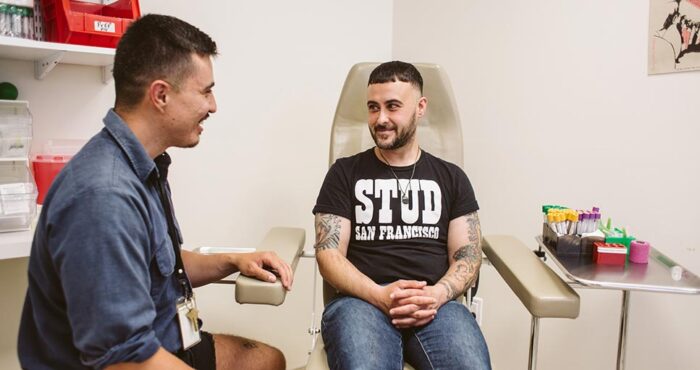What hard times & stress do for your HIV health
Stress may seem like an unavoidable consequence of daily life—with the top concerns being over money, work, family responsibilities and health concerns according to an annual survey conducted by the American Psychological Association. And people with HIV—who may be facing a new diagnosis, challenges related to disclosure, or health concerns—may experience even higher levels. In addition to affecting mental wellbeing and day-to-day enjoyment, how do stressful life events impact people with HIV?
Clinicians and researchers use the blanket term “trauma” to refer to deeply distressing life events, like physical abuse, sexual violence or the death of a loved one, that have great potential to inflict lasting emotional harm. But other more common life events—that may be positive or negative, short- or long-term—like getting married, having difficulty at work, being arrested, being robbed, or getting a promotion, can also be sources of stress and have impacts on health.
Evidence of stress and trauma’s impact on HIV
Jane Leserman, PhD, a psychiatrist at the University of North Carolina Chapel Hill, investigated the consequences of stress and trauma in a group of 490 men and women with HIV for a study published in the American Journal of Psychiatry. Over 27 months, the researchers interviewed participants receiving care at eight different infectious disease clinics every nine months with questionnaires that asked about traumatic events, sexual and physical abuse, childhood physical and emotional neglect, and recent stressful life events.
The number of people reporting past trauma was high—33% had been sexually abused, 38% had been physically abused, and 18% reported both types of abuse. Participants reported a median of three recent stressful events happening in the nine months before the study. During the study, 16 people died from AIDS-related causes and 29 people died from other causes.
Trauma significantly predicted risk of death from HIV or other causes. For every one experience of trauma, risk of death increased by 17% and risk of HIV-related death increased by 22%. When three traumas were experienced, risk of death by any cause increased by 60% and HIV-related death by 83%.
“Our clinical sample had considerable amounts of past trauma—and these are events that play into the mental health issues that crop up later in life. These traumatic experiences beget all kinds of psychological problems that are evidenced after childhood—and they continue to deal with these issues. There is considerable variation in how people’s HIV disease progresses. When people are dealing with other stresses and traumas—these concerns may overshadow HIV,” said Leserman.
There was no statistical association, however, between stressful life events and HIV-related mortality in this study (stressful life events were defined separately from instances of “trauma” in this study). Other studies have demonstrated that stress and other psychosocial variables such as hopelessness and depression can have an impact on viral load and CD4 count. A study by Gail Ironson, MD, PhD and colleagues with 177 men and women with HIV found that higher life event stress tended to predict viral load increases, even when adherence to antiretrovirals was controlled for. In addition, depression, hopelessness and negative coping styles were strongly related to declines in CD4 count.
Other more recent studies have concluded that while psychosocial factors may influence viral load and immune health, the effect is likely modest. “Because ART [antiretroviral therapy] adherence remains the primary predictor of virologic suppression and improved health outcomes for PLWH [people living with HIV], fostering adequate medication management must remain a priority in HIV care,” said lead author Jennifer Attonito, PhD.
Getting to undetectable is not enough
Focusing only on getting to undetectable ignores the many other challenges to health and wellness that people with HIV face, says Edward Machtinger, MD, a professor of clinical medicine and director of the Women’s HIV Program at the University of California, San Francisco. Although he sees most of the women at his clinic successfully achieve and maintain undetectable viral loads, he says that the majority are struggling with bigger and more damaging issues in their lives than HIV.
“Most of our patients have an undetectable viral load. And leaders in this country say my clinic is doing awesome. But if you scratch a little bit beneath the surface, you find that 40% of our patients are using hard drugs or drinking, half of our patients are depressed, and most of our patients aren’t fully out about their HIV status. A lot of people are living with abusive partners. Almost no one is working. Most of our patients are poor. And way too many of them are dying,” he said at a Positive Women’s Network event.
Machtinger said that over the past decade, he’s seen far more of his patients die from situations linked to trauma than from HIV-related causes. “Sixteen percent of people [who died] died from HIV. Eighty four percent of the patients in my program who died, died either directly through trauma, through murder, or indirectly from trauma through substance use, suicide, or hopelessness. Trauma leads to deficiency at every stage of the care continuum. It leads to being disengaged from care and two to three times likelihood of not adhering to your HIV medicines. Our clinics are not working well for women living with HIV. Or transgender women. Or young black gay men. We need to transform the resources we have to respond to what people need—healing.”
Focusing on healing
Machtinger says clinics could help their clients by incorporating “trauma-informed” care strategies into their practices. For instance people with HIV with past history of trauma, who have depression or use substances in a way that’s causing problems, might benefit more fully from substance use treatment that also includes treatment for post-traumatic stress disorder. Treating trauma and focusing on healing using a whole-person approach is key.
“People aren’t doomed if they have had trauma in their life,” said Leserman. “Just because you’ve had stressful life experiences doesn’t mean that your disease will get out of control. There are so many factors that play into it. There is so much you can do to ameliorate the effects of stress and trauma, and improve your life. Of course adherence to medications is important, but reaching out for psychiatric help if you have depression, starting medication or getting psychological counseling—all that is going to be really helpful.”
Sources
Attonito, J. and others. (2014). Antiretroviral treatment adherence as a mediating factor between psychosocial variables and HIV viral load. Journal of the Association of Nurses in AIDS Care. November, 2014.
Ironson, G. and others. (2005). Psychosocial factors predict CD4 and viral load change in men and women with human immunodeficiency virus in the era of highly active antiretroviral treatment. Psychosomatic Medicine. December, 2005.
Leserman, J. and others. (2007). Relation of lifetime trauma and depressive symptoms to mortality in HIV. American Journal of Psychiatry. November, 2007.









